
The Holiday *I did not have my children celebrate while they were growing up is fast approaching. (*long story; ask me sometime.)
This year, I plan to make chili for our Harvest Fest at our Church, and then head down to Mark and Jordan's to spend the weekend with them, and attend their Harvest Fest. I downloaded my Clip art from http://www.faithclipart.com/ just now and clicked on their Christian Holidays link. Here is what they have to say about Halloween:
Many Christians know All Hallows Eve by the secular name "Halloween," and avoid any celebration or religious observance of the day. The prevailing thought within many churches is that the holiday glorifies evil and is anti-Christian in its ideology. While many of the customs and traditions associated with the celebration find their roots in Medieval superstitions and ancient European rituals, the prevailing theme of the holiday was to give thanks for the harvest and honor family and friends who died in the past year.
The Church recognized this facet of the observance as they expanded their missionaries into Northern Europe and Britain. Seizing an opportunity to advance the cause of Christ, the Church incorporated Christian ideology into the various harvest festivals throughout Europe and changed the day of honoring saints and martyrs to correspond with the celebrations of the autumn months.
Halloween's Ecclesiastical History
Traditionally, All Hallows Eve is a vigil for the observance of All Saints Day and All Souls Day, which fall respectively on the first two days of November. The name itself means "holy evening". The night is marked within the Church with prayers, hymns, fasting, and the reading of various scriptures in preparation for the celebration of the faith of the saints and martyrs the following day.
All Hallows Eve falls on the 31st of October, which also happens to be the day for the Protestant celebration of the Reformation. Pope Gregory IV set the date for All Saints Day in the early ninth century to specifically interact with the Celtic festival Of Samhain. The prevailing belief within the Church Catechism was that "a perennial link of charity exists between the faithful who have already reached their heavenly home, those who are expiating their sins in purgatory and those who are still pilgrims on earth. Between them there is, too, an abundant exchange of all good things," (#1475).
All Hallows Eve and Autumn Celebrations
Despite the Church's success in establishing a Christian foundation for the autumn celebrations, many of the ancient customs and traditions associated with them were still practiced by the population. The carving of gourds and the wearing of costumes and masks to scare away malevolent spirits are typical of the superstitions carried over from these celebrations into the All Hallows Eve observance.
The custom of "trick-or-treating" has its origins in a ritual wherein the elders of a village or town would go from house to house and receive offerings of food and gifts for the souls of dead friends and relatives thought to visit on this night. This practice evolved during the Middle Ages, when beggars would travel from village to village and beg for "soul cakes". Villagers would offer prayers along with the cakes to those who had died in the past year for their transition to heaven.
Many countries around the world have some type of celebration during the Autumn Equinox that gives thanks for the harvest and pays tribute to those who have died. The concept of death among various cultures and societies, many of them Christian, is treated as a natural part of the process of life. Honoring relatives and friends who have "gone home to be with the Lord" is often viewed as a privilege that is pleasing to God. Numerous Christians find comfort in the belief that those who have gone before them are among the "cloud of witnesses" praying and interceding for them. The United States is one of the few nations in which the concept of death is socially uncomfortable and viewed as a taboo subject.
Whatever the prevailing view amongst churches, for many Christians, Catholic and Protestant, All Hallows Eve continues to be observed as a time of faith and hope. Remembering those who lived their Christian faith and served God with all their hearts, even to the point of giving their lives, provides inspiration and perseverance for those who still remain.


















1 comment:
Well, thank you for the insight on this event, it was very informative.
Post a Comment